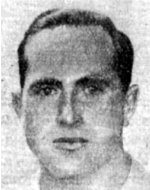Hefetz, Meir
Son of Miriam and Shemaiah, was born on 17.1.1920 in Riga, the capital of Latvia, and bought his first national education at the Hebrew Gymnasium in Riga. In the home of his educated parents, he absorbed the spirit of Russian and Western culture. When he came to Tel Aviv with his family in 1931, he continued to study and be educated for Zionist fulfillment. Until 1937 he studied at the Gymnasium “Nordia” and later spent more than a year in the training of the “Mahanot Haolim” movement in Givat Brenner. Through his humility, the soul of a virtuous man glowed, as evidenced by those who were impressed with him in their contact with him, both in training and in his work for three years afterward as secretary of the Tel Aviv Journalists’ Association and later as a clerk in the Yesod Bookstore. He joined the Hagana in 1936 and in 1940 proudly delivered his punishment for his participation in a demonstration against the British Land Law. The obligation to defend the country and to participate in the War of Revenge against the Nazi enemy led to the mobilization of the British Battalions in early 1942, and as a member of the Second Battalion Committee in North Africa participated in the struggle for the right to raise the Hebrew flag in their battalion. He later served in the Jewish Brigade and participated in battles in northern Italy. After the victory, he served as an interpreter for Russian at a senior British command in Austria and later in the search office of the British Supervisory Commission in Germany. He also dealt with the rescue of brothers in Europe and managed the office of the Center for the Diaspora in Germany. After his discharge he studied general and Hebrew history at the Hebrew University, social sciences, Middle Eastern economics, and statistics. Meir helped in editing and translation and participated in the preparation of two volumes of Jabotinsky’s writings. With the outbreak of the War of Independence he enlisted to defend Jerusalem. During the World War he refused to be an officer, but in the war of the Jews for their independence he agreed to this and was sent to the officers’ school. On his return, he was appointed a company commander and later a company commander in the “Beit Horon” battalion. He took care of his people and knew how to educate and lead them. Bright and intelligent, a very talented and dedicated commander who always maintained – even in military life – the person in him and in others. He fell on the 17th of Av, 5708 (August 17, 1948) in an attack on the Armon Hanatziv area. Meir was brought to rest in the military cemetery at Nahalat Yitzhak. After his fall, he was promoted to captain. His family donated a scholarship to an outstanding student at the Hebrew University in one of his subjects.
